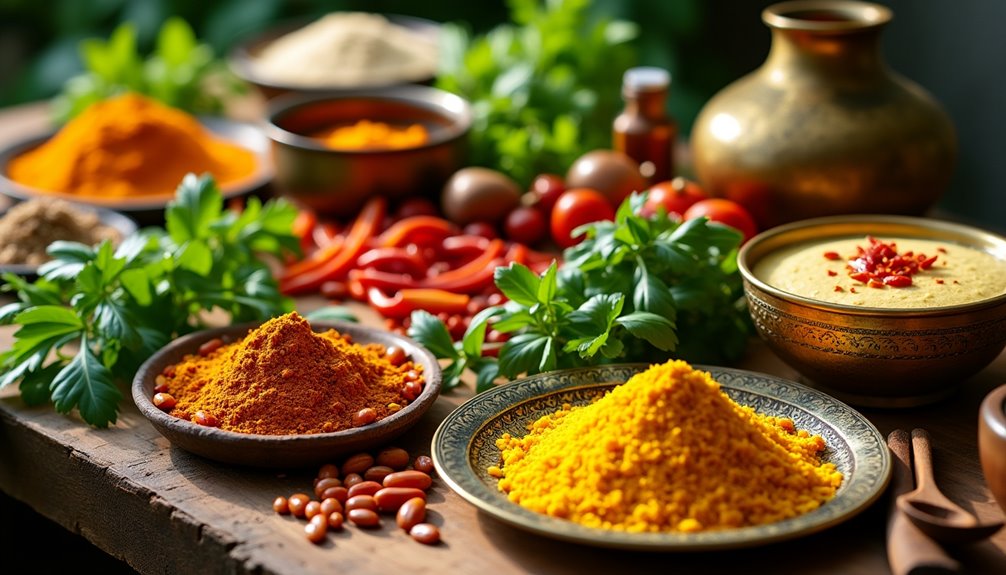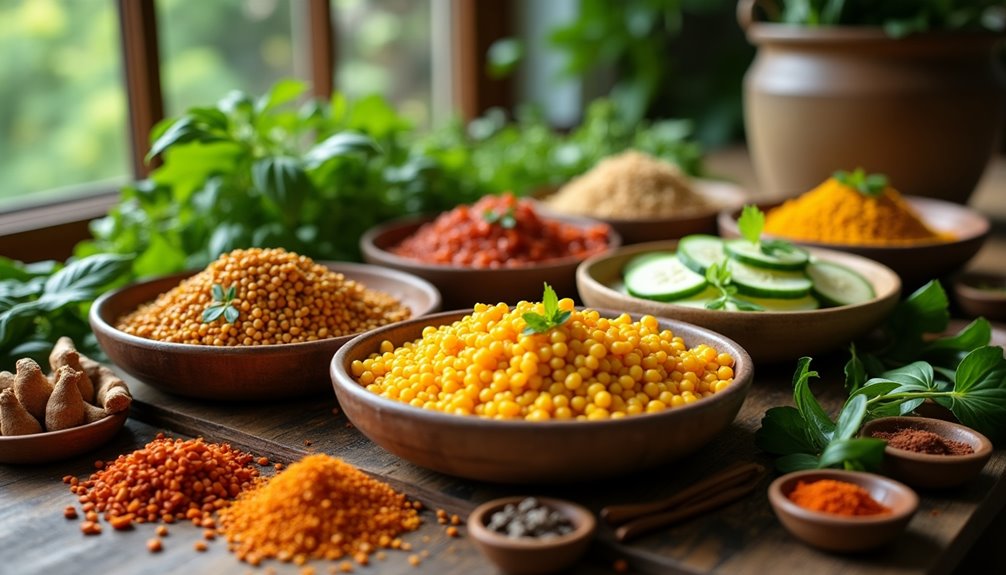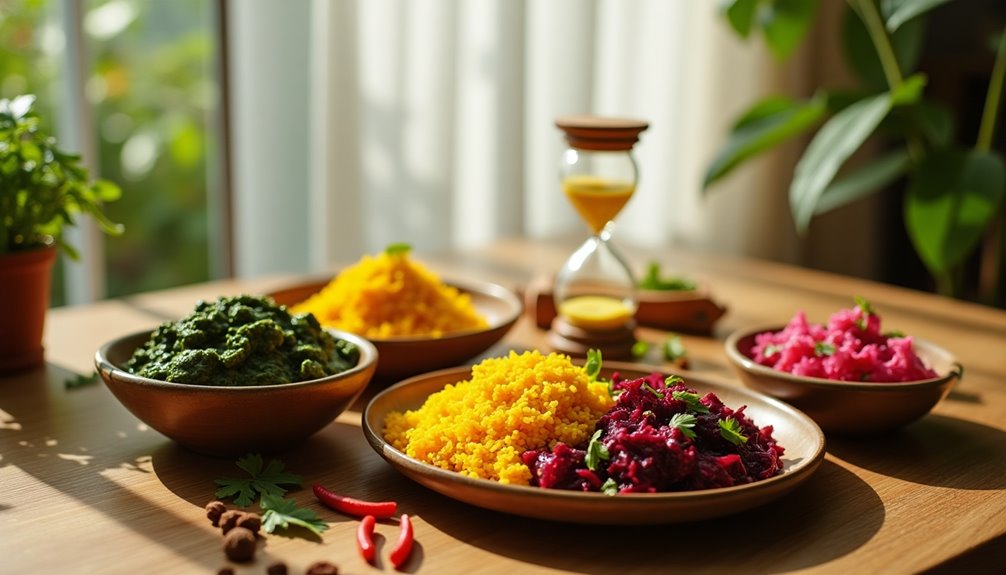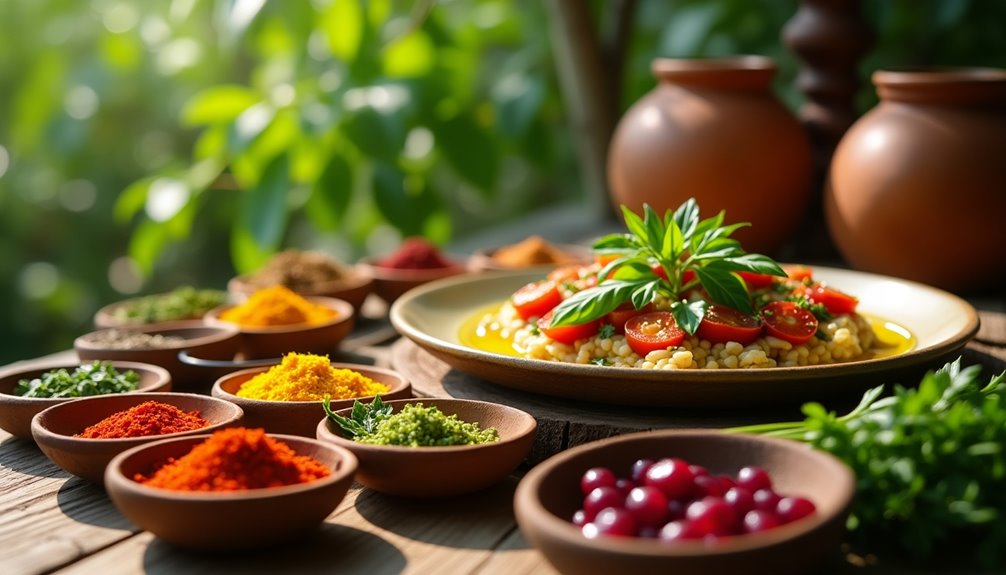An Ayurvedic diet connects your food choices to your unique dosha, promoting harmony in your body, mind, and spirit. You'll focus on seasonal eating and embrace personalized meal plans that cater to your specific needs. Choose warm, moist foods if you're Vata, light and cooling for Pitta, and stimulating, dry options for Kapha. Eat mindfully, savoring each bite to build a deeper relationship with your meals. By doing so, you can enhance your digestion, boost energy, and maintain emotional balance. Uncover more insights and practical tips to enrich your journey toward wellness and fulfillment.
Key Takeaways
- The Ayurvedic diet emphasizes dosha balancing through tailored eating to harmonize body, mind, and spirit.
- Foods are selected based on individual dosha characteristics: Vata (warm, moist), Pitta (cooling, light), and Kapha (light, dry).
- Seasonal eating is crucial, utilizing fresh ingredients that align with nature's cycles for optimal health.
- Mindful eating practices enhance the connection to food, promoting awareness and reducing stress for better digestion.
- A well-structured Ayurvedic diet can aid in weight management and address chronic gut inflammation effectively.
What Is Ayurveda?

Ayurveda, often described as "the science of life," offers a holistic approach to health and wellness that dates back thousands of years. It invites you to explore a path where your body, mind, and spirit interact harmoniously. By understanding Ayurvedic principles, you can cultivate balance in your life, empowering you to make choices that resonate with your unique constitution.
At the heart of Ayurveda is the concept of dosha balancing. Each person embodies a unique combination of three doshas—Vata, Pitta, and Kapha—representing different elements and qualities. You might find that your dosha influences your physical health, emotional well-being, and even your relationships. Recognizing your dosha allows you to tailor your lifestyle and diet to support your personal needs.
Incorporating Ayurvedic practices into your daily routine can be simple yet transformative. You can start by paying attention to the foods that nourish you, opting for seasonal and locally sourced ingredients. A plant-based diet can also enhance your wellness journey by providing significant health benefits that align with Ayurvedic principles.
Herbal remedies, teas, and spices are powerful allies in this journey, helping to restore balance and energy. Mindfulness and self-care practices like yoga and meditation further enhance your connection to your inner self.
Understanding Doshas

Discovering your dosha can be a transformative experience, as it helps you understand your unique physical and emotional makeup. In Ayurveda, you're classified into three main doshas: Vata, Pitta, and Kapha. Each dosha has distinct characteristics that influence everything from your energy levels to your emotional responses.
If you're predominantly Vata, you might be creative, quick-thinking, and prone to anxiety. Pitta types are often ambitious, passionate, and can become irritable when imbalanced. On the other hand, if you resonate with Kapha, you may be nurturing, steady, and sometimes lethargic. Recognizing your dosha characteristics allows you to embrace your strengths and address your challenges.
Balancing doshas is key to maintaining harmony in your life. For Vata, incorporating grounding foods like root vegetables and warm spices can calm the mind and body. Pitta types benefit from cooling foods such as cucumbers and mint, which help soothe their fiery nature. If you identify more with Kapha, light, stimulating foods like legumes and bitter greens can energize you and prevent sluggishness. Additionally, a balanced diet rich in whole food sources of protein can further support your overall well-being and energy levels.
Principles of the Ayurvedic Diet

Understanding your dosha sets the stage for a personalized approach to eating that aligns with your body's needs. By focusing on dosha balancing, you can restore harmony and energy in your life. Each dosha—Vata, Pitta, and Kapha—has unique qualities that influence your digestion, energy levels, and overall well-being. When you eat according to your dosha, you're not just nourishing your body; you're embracing a lifestyle that fosters connection and fulfillment.
One of the core principles of the Ayurvedic diet is seasonal eating. By tuning into the cycles of nature, you can support your body's natural rhythms. In warmer months, you might opt for lighter, hydrating foods that cool your system, while in colder months, heartier, warming dishes can provide comfort and stability. This mindful approach encourages you to listen to your body, ensuring that your meals are both nourishing and satisfying.
Moreover, consider the significance of mindful eating. Savor each bite, appreciate the flavors, and allow yourself to engage fully in the experience. This practice not only aids digestion but fosters a deeper connection to your food and your community. Additionally, incorporating custom meal plans can help you stay aligned with your dosha and seasonal needs.
Foods for Each Dosha

Each dosha—Vata, Pitta, and Kapha—requires specific foods to thrive and maintain balance. Understanding your dominant dosha can help you choose the right Ayurvedic recipes for dosha balancing. Here's a quick guide to foods that nourish each dosha:
- Vata: Favor warm, moist, and oily foods. Think hearty soups, stews, and cooked grains. Sweet fruits like bananas and cooked vegetables support Vata.
- Pitta: Opt for cooling, light foods. Incorporate fresh salads, sweet fruits like melons, and whole grains. Spices like coriander and mint can help mitigate Pitta's heat.
- Kapha: Choose light, dry, and stimulating foods. Include plenty of leafy greens, legumes, and spices like ginger and black pepper. You'll find that lighter meals help keep Kapha in check.
- Balanced Approach: Focus on incorporating a variety of foods that align with all three doshas. This way, you can create Ayurvedic recipes that maintain overall wellness and harmony. Additionally, embracing a natural calorie cycle can enhance your ability to balance your doshas effectively.
Meal Timing and Frequency

Meal timing and frequency play a pivotal role in aligning your eating habits with Ayurvedic principles. To nurture your body's digestive fire, consider your eating window. Ideally, you want to eat during daylight hours when your digestive system is most active. This means enjoying your meals between sunrise and sunset, allowing your body to process food efficiently.
Incorporating regular meal times helps maintain balance, promoting harmony in your daily routine. By eating three balanced meals a day, you can prevent late-night eating, which can disrupt your digestion and sleep. If you find yourself craving snacks in the evening, it might be an indication that your meals earlier in the day weren't substantial enough. Listen to your body and adjust accordingly.
Also, don't underestimate the fasting benefits that come with scheduled eating. Allowing your body to rest from digestion gives your systems a chance to rejuvenate. Additionally, practicing mindfulness during meals can help reduce stress and may contribute to lower blood pressure(https://www.example.com) levels.
You might experiment with intermittent fasting, where you limit your eating window, fostering a deeper connection with your hunger signals and enhancing your overall well-being.
Cooking Techniques in Ayurveda

In the world of Ayurveda, cooking techniques are just as essential as the ingredients you choose. The way you prepare your food can enhance its healing properties and bring balance to your body and mind. Embracing Ayurvedic cooking means focusing on the harmony between your meals and your individual constitution. Here are some fundamental techniques to incorporate into your cooking:
- Lightly sauté: Use ghee or coconut oil to sauté your vegetables, releasing their natural flavors while preserving nutrients.
- Steaming: This gentle method retains the integrity of seasonal ingredients, making them easier to digest.
- Slow cooking: Simmering soups or stews allows the spice combinations to meld beautifully, enhancing both taste and health benefits.
- Fermentation: Incorporate fermented foods to promote gut health, enriching your meals with probiotics. This is particularly important as traditional bread can lead to chronic gut inflammation.
Remember, using seasonal ingredients not only supports your local environment but also aligns your body with nature's rhythms.
As you experiment with spice combinations, consider how different flavors can affect your dosha. For example, warming spices like ginger and cinnamon can help balance Vata, while cooling spices like coriander and mint can soothe Pitta.
Mindful Eating Practices

Embracing mindful eating practices can transform your relationship with food, allowing you to savor each bite while nurturing your body and spirit. By incorporating food mindfulness into your daily routine, you'll cultivate a deeper awareness of what you're consuming and how it affects your well-being.
Start by creating intentional eating rituals. Set aside dedicated time for your meals, free from distractions like screens or bustling environments. This sacred space allows you to focus fully on the flavors, textures, and aromas of your food.
As you prepare your meals, take a moment to appreciate the ingredients—each one holds a unique energy that contributes to your health.
When you sit down to eat, take a few deep breaths to center yourself. This simple practice helps ground you in the present moment. As you begin to eat, chew slowly, allowing the food to release its natural flavors. Notice how your body feels with each bite. Are you satisfied? Are you still hungry? Listening to your body's cues fosters a healthier relationship with food.
Also, consider expressing gratitude for your meal. Acknowledging the effort that went into your food, from the farmers to the cook, fosters a sense of connection and belonging. Additionally, incorporating breath awareness into your mindful eating practice can enhance your focus and deepen your appreciation for each meal.
Benefits of an Ayurvedic Diet

An Ayurvedic diet offers an abundance of benefits that can enhance your overall well-being. By focusing on natural, whole foods and mindful eating, you'll find that your body and mind can thrive. Here are some key advantages you can expect from embracing this holistic approach:
- Weight Management: An Ayurvedic diet promotes balanced eating habits tailored to your unique constitution, helping you achieve and maintain a healthy weight without deprivation.
- Digestive Health: The emphasis on fresh, seasonal ingredients supports your digestive system. You'll enjoy meals that are easy to digest and rich in nutrients, contributing to a healthier gut.
- Enhanced Energy Levels: By consuming foods that align with your body's needs, you'll experience increased vitality. This newfound energy can improve your daily activities and overall mood.
- Stress Reduction: Incorporating mindfulness into your meals not only nourishes your body but also calms your mind. As you slow down and savor each bite, you'll notice a decrease in stress levels and greater emotional balance.
- Weight Loss Success: Recent research indicates that adopting a customized diet program can lead to 70% success rate in achieving weight loss goals, further enhancing the benefits of an Ayurvedic approach.
When you adopt an Ayurvedic diet, you're not just changing what you eat; you're embracing a lifestyle that fosters connection and self-awareness. You'll discover a community of like-minded individuals who support your journey toward wellness.
Frequently Asked Questions
Can I Follow an Ayurvedic Diet if I Have Dietary Restrictions?
Absolutely, you can follow a diet that suits your dietary restrictions! Start by making allergen substitutions and ingredient modifications that align with your needs. Consider creating customized meal plans that focus on whole, natural foods while avoiding triggers. Explore alternative cooking methods that enhance flavors without compromising safety. Remember, it's all about personalizing your approach to nourish your body while feeling connected to your food and community. You're not alone on this journey!
How Do I Determine My Ayurvedic Dosha?
To determine your dosha, you can start by taking a dosha quiz that assesses your physical and emotional traits. It's a fun way to connect with your unique self!
Consulting an Ayurvedic practitioner can also provide personalized insights. Once you identify your dosha, explore an Ayurvedic cookbook for dosha balancing foods that suit your needs.
Embracing this journey helps you feel a deeper sense of belonging to a holistic community.
Are There Any Ayurvedic Supplements I Should Consider?
Did you know that 75% of people report feeling better after using herbal supplements?
You might want to explore Ayurvedic herbs like ashwagandha or triphala for dosha balancing. These natural remedies can help restore harmony in your body.
It's all about finding what resonates with you personally, so delve into these options and see what fits your unique needs. Embracing these holistic practices can truly enhance your well-being and foster a sense of belonging.
Can I Integrate Ayurveda With Other Dietary Practices?
Absolutely, you can blend Ayurveda with other dietary practices! If you're leaning towards veganism, focus on balancing your doshas with plant-based foods rich in taste and nutrients.
Likewise, incorporating intermittent fasting can align with Ayurvedic principles, promoting digestion and detoxification.
Listen to your body, and adjust your meals to support your unique needs. This holistic approach creates a sense of belonging to a community that values natural remedies and mindful eating.
How Long Does It Take to See Results From an Ayurvedic Diet?
Seeing results from a new diet can feel like waiting for a flower to bloom—full of anticipation. With patience and consistency, you might notice changes within a few weeks, but lasting transformation often takes longer.
Embracing lifestyle changes and natural remedies creates a holistic approach to your health. Remember, it's a journey, so celebrate small victories along the way.
You're not alone in this; many are seeking the same sense of belonging and wellness.
Conclusion
Embracing an Ayurvedic diet isn't just about food; it's a journey into harmony with your body and mind. Picture yourself savoring vibrant, seasonal fruits and fragrant spices, each meal a step toward balance. As you tune into your dosha, you'll discover a personalized path to wellness, where mindful eating transforms each bite into a nourishing experience. Let the wisdom of Ayurveda guide you, awakening a vibrant, healthier you, rooted in nature's bounty and the rhythm of life.



